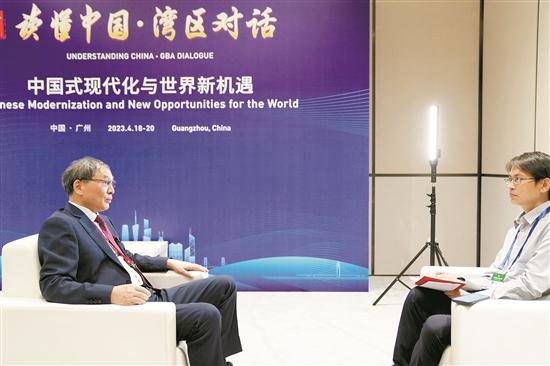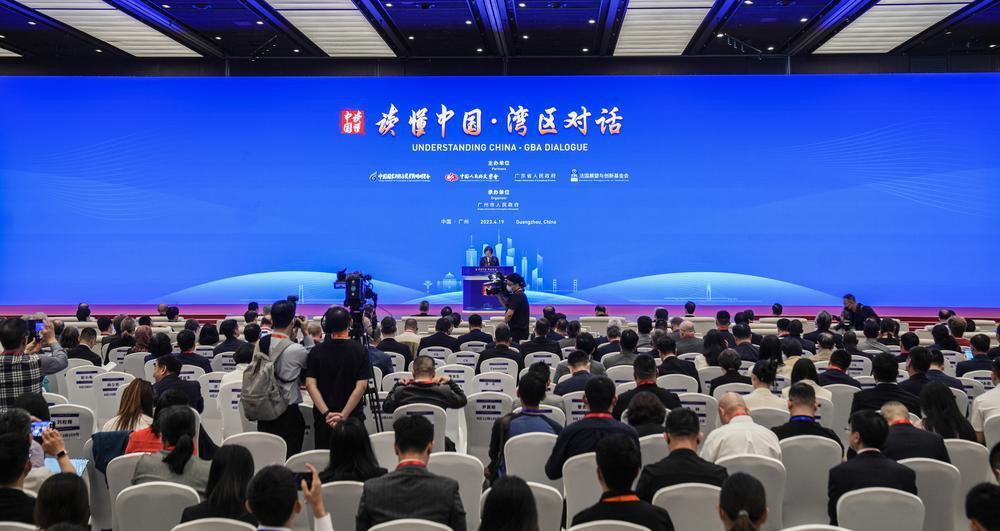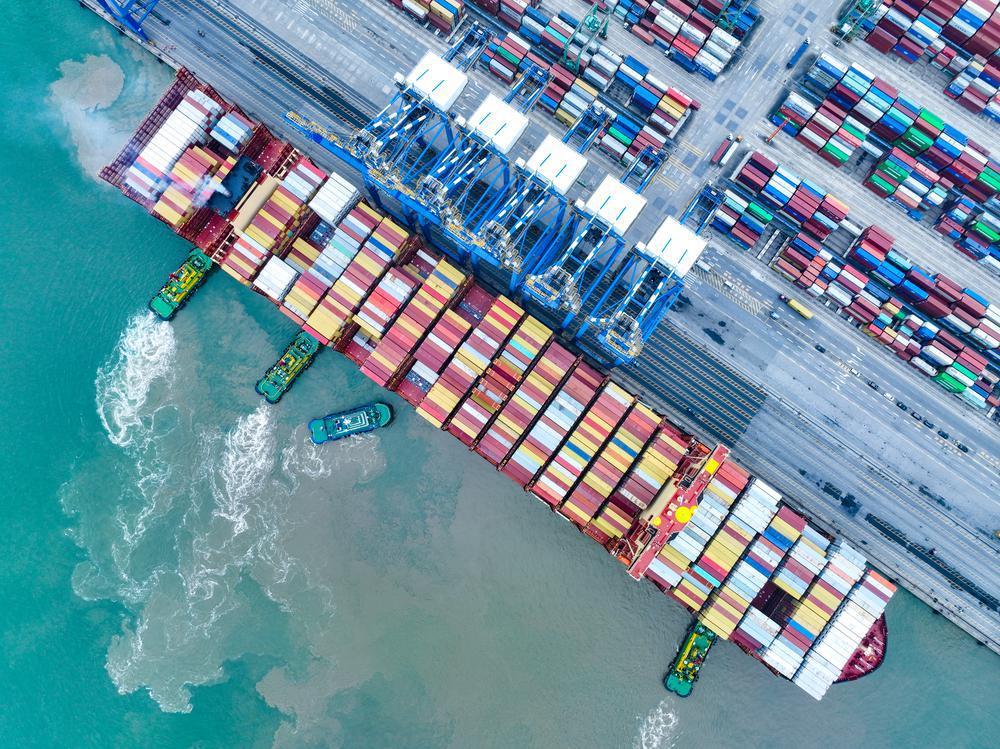Zheng Yongnian, renowned international political scholar and Director of the Qianhai Institute for International Affairs at the Chinese University of Hong Kong (Shenzhen), as well as the Chairman of the Guangzhou Institute of GBA, sat down for an exclusive interview with a reporter from Yangcheng Evening News during the "Understanding China - Greater Bay Area Dialogue".

Chinese modernization is very important for the international community
Yangcheng Evening News: As an international political scholar, you have worked and lived in countries such as the UK and Singapore. How do you understand "Chinese-style modernization"?

Zheng Yongnian: Firstly, there are diverse meanings, methods, and paths of modernization. Secondly, Chinese modernization is essential to the international community, as it represents a modernization approach that suits China's national conditions. Meanwhile, it should be noted that in Chinese modernization, we will not export our modernization approach to other countries. Instead, we hope that all other countries can find a modernization path that suits their own national conditions. Thirdly, "Chinese modernization" indicates that the modernization of China has commonalities with that of other countries. We need to learn from the successful experiences of Western modernization while also drawing lessons from its failures.
The GBA should lead Chinese modernization with its openinstitution and integration
Yangcheng Evening News:Guangdong should take the lead in promoting Chinese modernization. What are the advantages of the province in fulfilling this mission?
Zheng Yongnian: Guangdong has four advantages. Firstly, it has experience. Guangzhou is the birthplace of China's democratic revolution and the pioneer of China's reform and opening-up. These exploratory experiences are valuable assets for Guangdong to promote modernization. Secondly, it has a large market. The private economy in the Pearl River Delta is developed, and Guangdong owns the most developed domestic market. In addition, the province possesses distinctive advantages in science and technology innovation and manufacturing. In addition, Guangdong has a long history of international trade and commerce with the West and is currently one of China's most open regions. Fourthly, it has an institutional advantage, which is its strong government leadership.
Yangcheng Evening News: The Greater Bay Area aims to lead Chinese modernization. In which areas do you think it needs to lead and how?
Zheng Yongnian: The Greater Bay Area needs to lead Chinese modernization with its open institution and integration of the Greater Bay Area. In terms of open institution, Hong Kong and Macao implement the"one country, two systems" policy. Hong Kong's rules, regulations, management, and standards are very international and modern, and Guangzhou and Shenzhen also have their own new rules and standards. We need to leverage our comparative advantages, align with the highly internationalized rules of Hong Kong, and at the same time, promote the rules of the Greater Bay Area to the outside world.In terms of integrated development, Guangdong has three major platforms – Hengqin, Qianhai, and Nansha. The "Nansha Plan" explicitly states that it needs to benchmark against international high-level free trade agreements such as the Comprehensive and Progressive Trans-Pacific Partnership Agreement (CPTPP) and the Digital Economy Partnership Agreement (DEPA). I think that the Greater Bay Area needs to become a leading region of Chinese modernization through integration.

China's strong externalities bring opportunities to the world
Yangcheng Evening News: Overseas attention is focused on what new opportunities Chinese modernization can provide to the world.
Zheng Yongnian: According to the International Monetary Fund's forecast for this year, China's contribution to global economic growth will recover to about 30%. Everyone is paying attention to China, because China's modernization and economic development are carried out in an open state. As the world's second-largest economy, China's development shows strong externalities, which are opportunities from an economic perspective.
专访郑永年:粤港澳大湾区如何成为中国式现代化的引领地?
在“读懂中国·湾区对话”专题论坛期间,知名国际政治学者——香港中文大学(深圳)前海国际事务研究院院长、广州粤港澳大湾区研究院理事长郑永年,接受了羊城晚报全媒体记者独家专访。
中国式现代化对国际社会来说非常重要
羊城晚报:作为一名国际政治学者,曾在英国、新加坡等国家工作生活过,您怎样理解中国式现代化?
郑永年:第一点,现代化的意义、方式和路径是多元的。
第二点,对国际社会来说也非常重要——我们提出中国式现代化,就是说我们找到了符合中国国情的现代化。同时,我们强调中国式现代化表明我们不会把自己的现代化方式输出到其他国家,我们希望所有其他的国家也能找到符合自己国情的现代化。
第三点,“中国式现代化”表明中国的现代化与其他国家的现代化也有着共性的一面。我们既要学习西方现代化的一些成功经验,也要吸取西方现代化失败的教训。
大湾区要通过制度型开放和融合来实现“引领”
羊城晚报:广东要在推进中国式现代化建设中走在前列,实现这一使命任务,广东的优势有哪些?
郑永年:广东的优势有几个层面。
一是经验层面。广州是中国民主革命的策源地和中国改革开放的排头兵。这些探索经验对于广东推进现代化建设是宝贵的财富。
二是市场。珠江三角洲民营经济发达,广东是国内市场最发达的地方,同时,广东的科技创新优势、制造优势也很明显。
三是国际商贸往来。近代以来,与西方的贸易往来也是在广州开始的。现在,广东也是中国最为开放的地方之一。
四是体制的优势,即强有力的领导。

羊城晚报:粤港澳大湾区要成为中国式现代化的引领地。您认为需要在哪些方面引领,怎么引领?
郑永年:我认为,粤港澳大湾区要引领中国式现代化需要通过制度型开放和粤港澳大湾区的大融合来实现。
在制度型开放方面,粤港澳大湾区由于港澳实行的是“一国两制”。香港的规则、规制、管理、标准是非常国际化、现代化的,广州、深圳也有自己的一些新的规则、标准。我们要抓住自己的比较优势,在对接香港高度国际化的规则的同时,使大湾区自己的规则也走向世界。
在融合发展方面,广东有横琴、前海、南沙三个重大平台。《南沙方案》中明确规定要对标《全面与进步跨太平洋伙伴关系协定》(CPTPP)、《数字经济伙伴关系协定》(DEPA)等国际高水平自贸协定规则。我认为,粤港澳大湾区要成为中国式现代化的引领地,需要通过大融合来实现。
中国发展强大的外在性、外部性为世界带来机遇
羊城晚报:海外比较关注中国式现代化能给世界提供哪些新机遇?
郑永年:根据国际货币基金组织今年的预测,今年中国对全球经济增长贡献率会恢复到30%左右,大家都在关注中国。因为中国式现代化、中国经济的发展,是在开放状态下进行的。作为世界第二大经济体,中国的发展有强大的外在性、外部性,而这种外在性、外部性从经济学上来说就是机遇。
文|羊城晚报全媒体记者 董柳
图|羊城晚报全媒体记者 周巍 宋金峪(署名除外)
翻译|刘佳慧
责编|王瑜瑛









